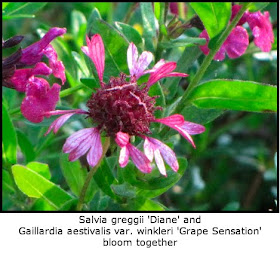
My garden is young (2005) and most of my planting over the last few years has been experimental while I worked with the growing conditions and identified the best performers. I've arrived at a series of combinations that I want to use as primary plants in the redesign of the gardens.
Located inside the cottage garden fence are two, tough Texas perennials that love full sun, good drainage and are rated for zones 7-9. The two bloom together, off and on, from spring until frost.
Salvia greggii 'Diane' and her companion Gaillardia aestivalis var. winkleri 'Grape Sensation' have an identical bloom color, too. Not only that, but they both grow 18" high x 36" wide. Both are deer and rabbit resistant, so they could go outside the fence.
These perennials are coincidentally from Texas, although I purchased them from Plant Delights Nursery's open house last fall. I'd like to tell you that these are easy plants to find, but not so. There are very few plants in my garden that are difficult to find, but these two fall into that category.

Gaillardia 'Grape Sensation' blooms profusely like other blanket flowers. However, the blooms are an appealing, deep grape color. Even the centers are beautiful round grapes, so without petals the plant still looks attractive.
Salvia greggii 'Diane' is the same grape color. Unlike many greggii colors that grow to three feet high, this one is a nice, compact plant for the front of the border. It is semi-evergreen, with remaining green foliage throughout most of the year. It is a hummingbird favorite, too.
So what will I change to improve the design around this favorite pair? Why?
- These plants are in a narrow bed that flanks the right bank of our water feature (stream) and cannot be outfitted with drip irrigation. So, it is best for me to grow xeric plants in this flower bed. By using xeric plants, I won't have to spend so much time hand-watering plants.
- Right now, the spring color scheme is pink, followed by yellow and then magenta and purple. I'd like to simplify and unify this border with a purple/pink bloom scheme.
- Complimentary foliage colors (green, silver, purple) and shapes (small, wide, wispy) that look good most of the year will be important since this bed is literally in our front yard.
What plants will be used?
- There are yellow daylilies that will be moved to another location. The daylilies will perform better where there is drip irrigation. I have already transplanted the yellow leucanthemum 'Broadway Lights' to the outer gardens. The yellow blooming plants will be teamed up with blue in their new locations.
- Along the front of the bed is an established edging of dianthus (Cottage Pinks) that I will keep for the fragrant blooms and good behavior. The blue foliage and pink flowers of the dianthus works well with the salvia and gaillardia.
- I'm going to add lavender 'Munstead' to the same flower bed. Lavender likes the same growing conditions and the silver foliage as well as the blue-purple blooms work well with the color combination.
- I have already transplanted tips of sedum 'Purple Emperor' to the flower bed. I like the wide, succulent foliage shape to complement the wispy silver lavender wands, the blue foliage of the dianthus and the small green leaves of the salvia and gaillardia. Like the salvia, gaillardia, dianthus and lavender, the sedum will perform well with the same conditions.
Words and photos by Freda Cameron; Location: home gardens; October 2009